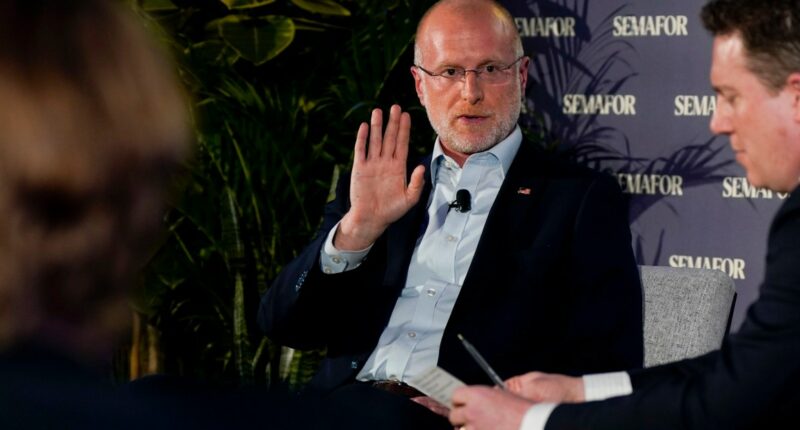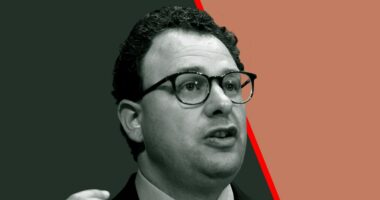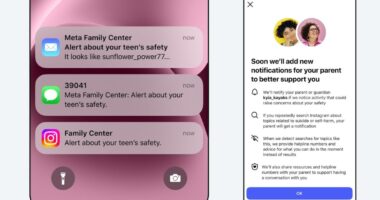Share this @internewscast.com
On Monday, the Freedom of the Press Foundation submitted a complaint against Federal Communications Commission Chairman Brendan Carr. The filing, addressed to the Office of Disciplinary Counsel at the DC Court of Appeals, asserts that Carr repeatedly violated fundamental conduct principles as a licensed attorney by utilizing his authority to influence media outlets’ speech. Though the legal complaint might be a long shot, it encapsulates months of Carr’s intensifying assault on free speech.
Though the complaint’s instances extend over several months, Status reveals that the FPF’s “tipping point” was Carr’s recent sanctioning of a merger between Paramount and Skydance — a scenario that began as dubious and has continuously appeared more concerning.
For an extended period, the FCC allowed the request to stagnate while Paramount was embroiled in a questionable anti-speech lawsuit filed by President Donald Trump. Subsequently, Paramount paid Trump $16 million in settlement funds — but this was insufficient. The merger received approval with the stipulation that the newly formed company appoint an ombudsman to ensure the broadcast of viewpoints “across the political and ideological spectrum,” a requirement absent from the FCC’s standard regulations. During this period, Paramount subsidiary CBS canceled comedian and Trump-critic Stephen Colbert’s show, maintaining that the decision was financially driven, only for Carr to later appear on CNBC, suggesting the cancellation aided in complying with FCC law.
“The American people simply do not trust the mainstream media, and for broadcasters — again, different than cable, different than podcasts — for broadcasters, they have a federal license, and they are obligated to operate in the public interest,” Carr remarked when queried regarding the end of Colbert’s show. “And to the extent that we’re starting to see some changes, I think that’s a good thing.”
An “unconstitutional shakedown”
The combination of Trump and Carr’s actions can only be interpreted as an assault on the First Amendment, or as termed by the complaint, an “unconstitutional shakedown.” Trump was displeased with how a news outlet edited an interview with a political opponent. In retaliation, one of his officials threatened the outlet’s parent company. To appease him, the company consented to produce more content aligned with his preferred politics, under the oversight of a government-appointed monitor.
The victims, nominally, are Paramount and Skydance, two large corporations facing threats to their financial stability. However, the real casualties are all viewers of news, comedy, or any form of broadcast media, with the broader stakes being the autonomy to decide what content to watch.
The merger conditions require “a diversity of viewpoints,” which sounds like a lofty goal — but let’s play out what it means in Carr and Trump’s world. The original CBS lawsuit claimed the network had edited an interview with Democratic presidential nominee Kamala Harris that made Harris look too articulate — so to start, the ombudsman will probably be looking at how politicians are presented in news coverage, encouraging journalists to show Trump’s critics in a negative light.
Carr celebrated Colbert’s cancellation as a “course correction,” so comedians are on notice too. And over at another network, Disney, Carr has presented attempts to create diverse show lineups as an example of “invidious” and illegal “DEI.” So prepare for probes into the racial or gender makeup of the shows it greenlights, making sure its TV programming isn’t too diverse in the wrong ways.
The whole situation was skewered earlier this month in the season debut of one of Paramount’s crown-jewel TV shows, South Park, which sees the eponymous town shaken down with a multibillion-dollar lawsuit from Trump. It’s full of barely veiled parallels with the Paramount situation and suggestions that it’s South Park, not just South Park, under threat. (The White House insulted the show, but so far, it seems safe.)
Conservatives have warned darkly for years that Democratic presidents’ FCC operations amount to censorship, frequently raising the specter of a “new Fairness Doctrine,” referring to the long-defunct rule that broadcasters must present multiple viewpoints on matters of public interest. The offending policies have ranged from actual surveys of newsroom operations to far-afield consumer protection efforts: in 2016, Trump claimed that “net neutrality is the Fairness Doctrine” and “will target conservative media.” Now, a Republican commissioner just put the government’s thumb straight on the scale of American culture, insisting that networks shouldn’t build their businesses on what customers like — they should look to Donald Trump.
In a country where media companies are endlessly consolidating, the FCC is in a position to stall any business that seeks a merger until it extracts the terms it wants. It’s already landed anti-“DEI” provisions from a different company, Verizon, and there’s no reason to think it will stop there. It seems unlikely the FPF’s complaint will seriously derail this mission. But it baldly lays out just how badly Carr has failed at doing what he demands of broadcasters: serving the public interest by allowing a free expression of views.







